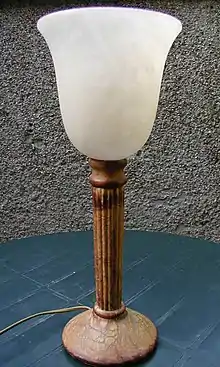alabaster
English

Alternative forms
- alabastre (obsolete)
- alablaster (obsolete)
Etymology
From Middle English alabastre, from Old French alabastre, from Latin alabaster (“box for perfume made of alabaster”), from Ancient Greek ἀλάβαστρος (alábastros), from earlier ἀλάβαστος (alábastos, “vase made of alabaster”). This may further derive from Egyptian ꜥj-r-bꜣstjt (“vessel of the Egyptian goddess Bast”). The Latin suffix -aster is unrelated, but may have influenced the spelling of the borrowing from Ancient Greek (whence a direct loan could have been rendered as *alabastrus).
Pronunciation
Noun
alabaster (usually uncountable, plural alabasters)
- A fine-grained white or lightly-tinted variety of gypsum, used ornamentally.
- c. 1596–1598 (date written), William Shakespeare, “The Merchant of Venice”, in Mr. William Shakespeares Comedies, Histories, & Tragedies […] (First Folio), London: […] Isaac Iaggard, and Ed[ward] Blount, published 1623, →OCLC, [Act I, scene i], page 163, lines 89–90:
- Why ſhould a man whoſe bloud is warme within,
Sit like his Grandſire, cut in Alabaſter?
- 1867, Dante Alghieri, “Paradiso”, in Henry Wadsworth Longfellow, transl., The Divine Comedy, Canto XV, lines 22–23:
- Nor was the flame dissevered from its ribbon
But like a radiant fillet ran along
So that fire seemed it behind alabaster.
- 1915 May 15, “Egyptian Antiquities for Metropolitan”, in The New York Times (PDF), archived from the original on 2015-09-14:
- One of the striking relics found at the tomb, was a Canopic portrait head of Queen Tii, made entirely of alabaster except the eyes and eyebrows, which were inlaid lapis lazuli and osidian.
- (historical) A variety of calcite, translucent and sometimes banded.
- An off-white colour, like that of alabaster.
- alabaster:
Derived terms
Translations
| ||||||
Adjective
alabaster (not comparable)
- Made of alabaster.
- The crown is stored in an alabaster box with an onyx handle and a gold lock.
- 1611, The Holy Bible, […] (King James Version), London: […] Robert Barker, […], →OCLC, Mark 14:3:
- And being in Bethany, in the house of Simon the leper, as he sat at meat, there came a woman having an alabaster box of ointment of spikenard very precious; and she brake the box, and poured it on his head.
- 1980, Colin Thubron, Seafarers: The Venetians, page 41:
- An enameled miniature of Christ is set in the center of a jeweled alabaster paten, the plate that holds the bread during Communion services.
- Resembling alabaster: white, pale, translucent.
- An ominous alabaster fog settled in the valley.
- 1594, William Shakespeare, Lucrece (First Quarto), London: […] Richard Field, for Iohn Harrison, […], →OCLC, lines 418-420:
- With more than admiration he admir’d
Her azure veins, her alabaster skin,
Her coral lips, her snow-white dimpled chin.
- a. 1887 (date written), Emily Dickinson, “[Book IV.—Time and Eternity] Safe in Their Alabaster Chambers”, in Mabel Loomis Todd and T[homas] W[entworth] Higginson, editors, Poems, First Series, Boston, Mass.: Roberts Brothers, published 1890, →OCLC, page 113:
- Safe in their alabaster chambers
Untouched by morning, untouched by noon
Sleep the meek members of the resurrection,
Rafters of satin, and roof of stone.
- 1895, “America the Beautiful”, Katharine Lee Bates (lyrics), Samuel A. Ward (music):
- Thine alabaster cities gleam
Undimmed by human tears!
Translations
|
Anagrams
Latin
Alternative forms
Etymology
Borrowed from Ancient Greek ἀλάβαστρος (alábastros), from earlier ἀλάβαστος (alábastos, “vase made of alabaster”).
Pronunciation
- (Classical) IPA(key): /a.laˈbas.ter/, [äɫ̪äˈbäs̠t̪ɛr]
- (modern Italianate Ecclesiastical) IPA(key): /a.laˈbas.ter/, [äläˈbäst̪er]
Noun
alabaster m (genitive alabastrī); second declension
Declension
Second-declension noun (nominative singular in -er).
Descendants
References
- “alabaster”, in Charlton T. Lewis and Charles Short (1879) A Latin Dictionary, Oxford: Clarendon Press
- alabaster in Gaffiot, Félix (1934) Dictionnaire illustré latin-français, Hachette.
- “alabaster”, in The Perseus Project (1999) Perseus Encyclopedia
Middle English
Polish
Alternative forms
- alabastr (obsolete)
Etymology
Inherited from Old Polish alabastyr.
Pronunciation
- IPA(key): /a.laˈbas.tɛr/
- (Middle Polish) IPA(key): /a.laˈbas.tɛr/
Audio (file) - Rhymes: -astɛr
- Syllabification: a‧la‧bas‧ter
Noun
alabaster m inan
- (mineralogy) alabaster (fine-grained white or lightly-tinted variety of gypsum)
- kopalnia alabastru ― an alabaster mine
- (zrobiony, wykonany) z alabastru ― (made) of/from/out of alabaster
- alabaster object
Declension
Further reading
- alabaster in Wielki słownik języka polskiego, Instytut Języka Polskiego PAN
- alabaster in Polish dictionaries at PWN
- Maria Renata Mayenowa, Stanisław Rospond, Witold Taszycki, Stefan Hrabec, Władysław Kuraszkiewicz (2010-2023) “alabaster”, in Słownik Polszczyzny XVI Wieku [A Dictionary of 16th Century Polish]
- Teresa Sokołowska (14.01.2022) “ALABASTR, ALABASTER, *HALABASTER”, in Elektroniczny Słownik Języka Polskiego XVII i XVIII Wieku [Electronic Dictionary of the Polish Language of the XVII and XVIII Century]
- Samuel Bogumił Linde (1807–1814) “alabaster”, in Słownik języka polskiego
- Aleksander Zdanowicz (1861) “alabaster”, in Słownik języka polskiego, Wilno 1861
- J. Karłowicz, A. Kryński, W. Niedźwiedzki, editors (1900), “alabaster”, in Słownik języka polskiego (in Polish), volume 1, Warsaw, page 21
Serbo-Croatian
Swedish
Declension
| Declension of alabaster | ||||
|---|---|---|---|---|
| Uncountable | ||||
| Indefinite | Definite | |||
| Nominative | alabaster | alabastern | — | — |
| Genitive | alabasters | alabasterns | — | — |